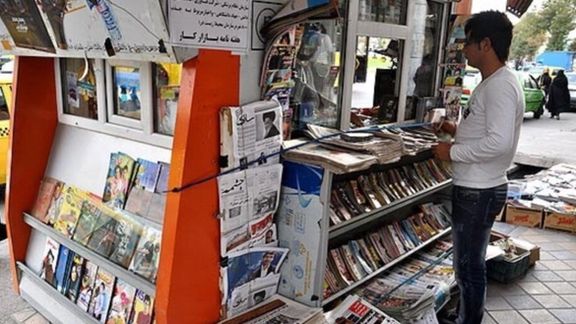Iran Media Cautious In Commenting On Nuclear Talks

Iranian media Tuesday was reserved, or disinterested over prospects for Iran’s resumed nuclear talks in Vienna, anxious not to sound negative or raise hopes.

Iranian media Tuesday was reserved, or disinterested over prospects for Iran’s resumed nuclear talks in Vienna, anxious not to sound negative or raise hopes.
It appeared that the media have been warned to avoid criticism of the negotiating team and its strategies, as well as raise hopes about the outcome of the talks.
Some outlets steered clear of comment. Khabar Online, a popular conservative news website close to former nuclear negotiator Ali Larijani, a supporter of the 2015 nuclear deal, adorned its four top spots with articles on football advertising rights, shortages of diabetes medicines, an interview with a pop singer, and a report on President Ebrahim Raisi's (Raeesi) provincial visits.
In a note published by Arman daily, reformist journalist Ahmad Zeidabadi suggested the reserved approach resulted from self-censorship due to fears that anyone who discussed the dangers to the country if talks failed would be accused of "playing in the enemy's field.”
Zeidabadi said that the Iranian delegation should not leave the Vienna talks empty-handed under any circumstances "because domestic, regional and international situations will be extremely different from the current situation." He added: "Nothing more can be said for now.”
Zeidabadi did, however, add that the new negotiation team appointed by Raisi had a better and more realistic understanding of the country's economic and other circumstances than their predecessors, even if they had to adapt their previous opposition to the 2015 deal, the JCPOA (Joint Comprehensive Plan of Action.
In the reformist Shargh newspaper, former diplomat Javid Ghorbanoghli wrote of his optimism that the Raisi administration had recognized the “urgent need" to resolve problems arising from United States sanctions that hampered Iran’s international economic and financial relations.
Ghorbanoghli criticized Iranian negotiators and the foreign minister for excluding the US from the talks while insisting on the lifting of US sanctions. The talks, which began in April under the previous administration of President Hassan Rouhani, take place within the structures of the JCPOA, with the US taking part indirectly as it left the JCPOA in 2018.
It is not right, he maintained, to limit the negotiations to European countries which hardliners themselves accuse of failure in saving the nuclear deal when the US abandoned it and not engaging in economic relations with Iran despite their commitments under the deal.
Ghorbanoghli argued that Iran’s insistence on acquiring guarantees that the US would not again leave the JCPOA was logical but not good strategy and not feasible. He also suggested that Iran should not see advancing its nuclear program – through stockpiling highly-enriched uranium and using modern centrifuges – as a winning card for the talks.
He pointed out that expanding the nuclear program could leave Iran in a more difficult position should the talks fail as it would alienate Russia and China: "Those who have devised this plan must offer a clear picture to the country's decisionmakers of what steps they will take next if their plan fails."